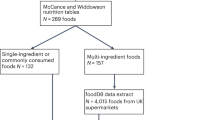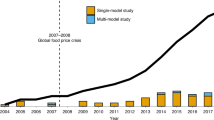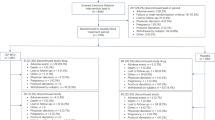Abstract
Objectives: To evaluate energy expenditure after three isoenergetic meals of different nutrient composition and to establish the relationship between the thermic effect of food (TEF), subsequent energy intake from a test meal and satiety sensations related to consumption.
Design: The study employed a repeated measures design. Ten subjects received, in a randomized order, three meals of 2331±36 kJ (557±9 kcal). About 68% of energy from protein in the high protein meal (HP), 69% from carbohydrate in the high carbohydrate meal (HC) and 70% from fat in the high fat meal (HF).
Setting: The experiments were performed at the University of Milan.
Subjects: Ten normal body-weight healthy women.
Methods: Energy expenditure was measured by indirect calorimetric measurements, using an open-circuit ventilated-hood system; intake was assessed 7 h later by weighing the food consumed from a test meal and satiety sensations were rated by means of a satiety rating questionnaire.
Results: TEF was 261±59, 92±67 and 97±71 kJ over 7 h after the HP, HC and HF meals, respectively. The HP meal was the most thermogenic (P<0.001) and it determined the highest sensation of fullness (P=0.002). There were no differences in the sensations and thermic effect between fat and carbohydrate meals. A significant relationship linked TEF to fullness sensation (r=0.41, P=0.025). Energy intake from the test meal was comparable after HP, HC and HF meals.
Conclusions: Our results suggest that TEF contributes to the satiating power of foods.
Sponsorship: This work was supported by the National Research Council, targeted project ‘Prevention and Control of Disease Factors’, subproject ‘Nutrition’, grant no. 94.00365.PF41.
This is a preview of subscription content, access via your institution
Access options
Subscribe to this journal
Receive 12 print issues and online access
$259.00 per year
only $21.58 per issue
Buy this article
- Purchase on Springer Link
- Instant access to full article PDF
Prices may be subject to local taxes which are calculated during checkout
Similar content being viewed by others
Author information
Authors and Affiliations
Rights and permissions
About this article
Cite this article
Crovetti, R., Porrini, M., Santangelo, A. et al. The influence of thermic effect of food on satiety. Eur J Clin Nutr 52, 482–488 (1998). https://doi.org/10.1038/sj.ejcn.1600578
Received:
Revised:
Accepted:
Published:
Issue Date:
DOI: https://doi.org/10.1038/sj.ejcn.1600578
Keywords
This article is cited by
-
Secretin activates brown fat and induces satiation
Nature Metabolism (2021)
-
A randomized, controlled, crossover trial to assess the acute appetitive and metabolic effects of sausage and egg-based convenience breakfast meals in overweight premenopausal women
Nutrition Journal (2015)
-
A high-protein diet for reducing body fat: mechanisms and possible caveats
Nutrition & Metabolism (2014)
-
The effect of a low-fat, high-protein or high-carbohydrate ad libitum diet on weight loss maintenance and metabolic risk factors
International Journal of Obesity (2009)
-
Effects of high and normal soyprotein breakfasts on satiety and subsequent energy intake, including amino acid and ‘satiety’ hormone responses
European Journal of Nutrition (2009)



